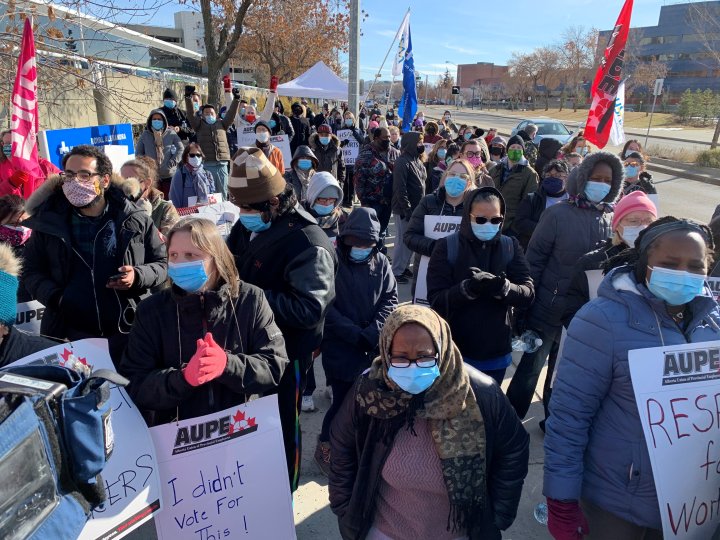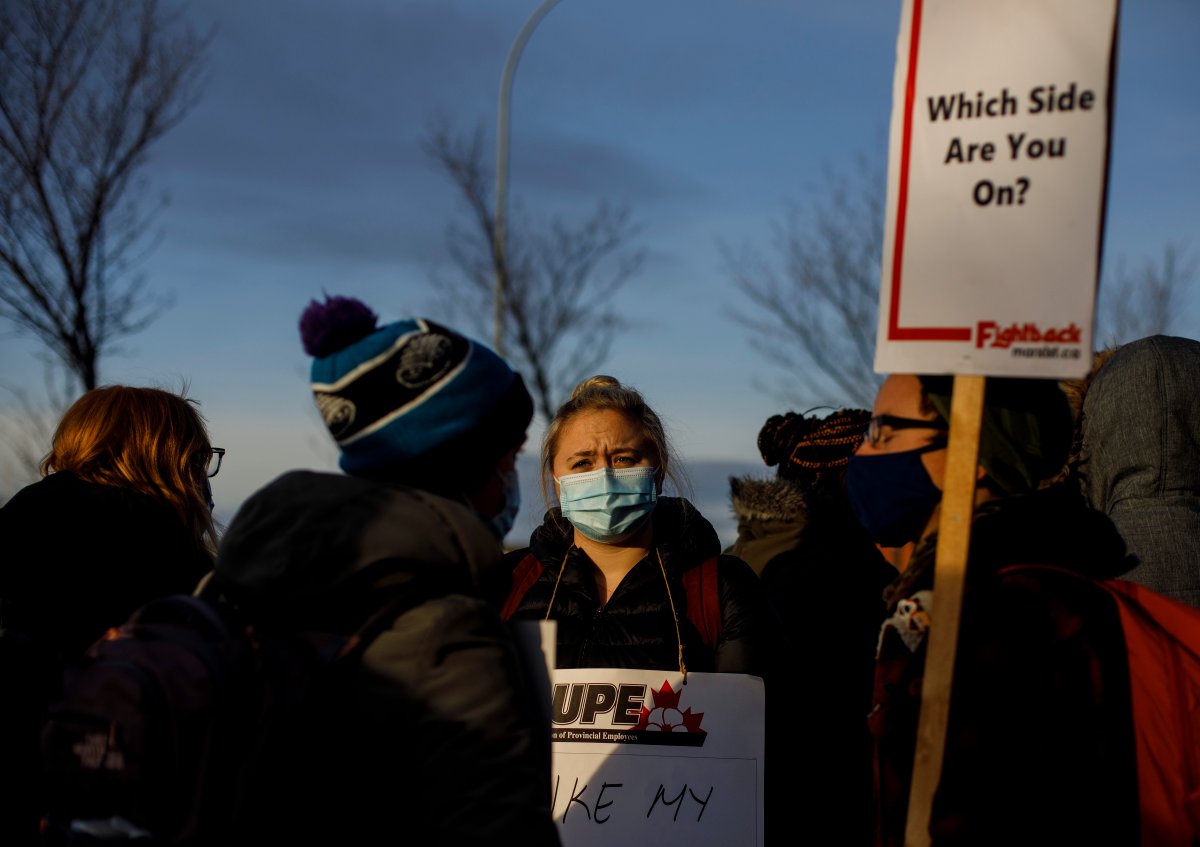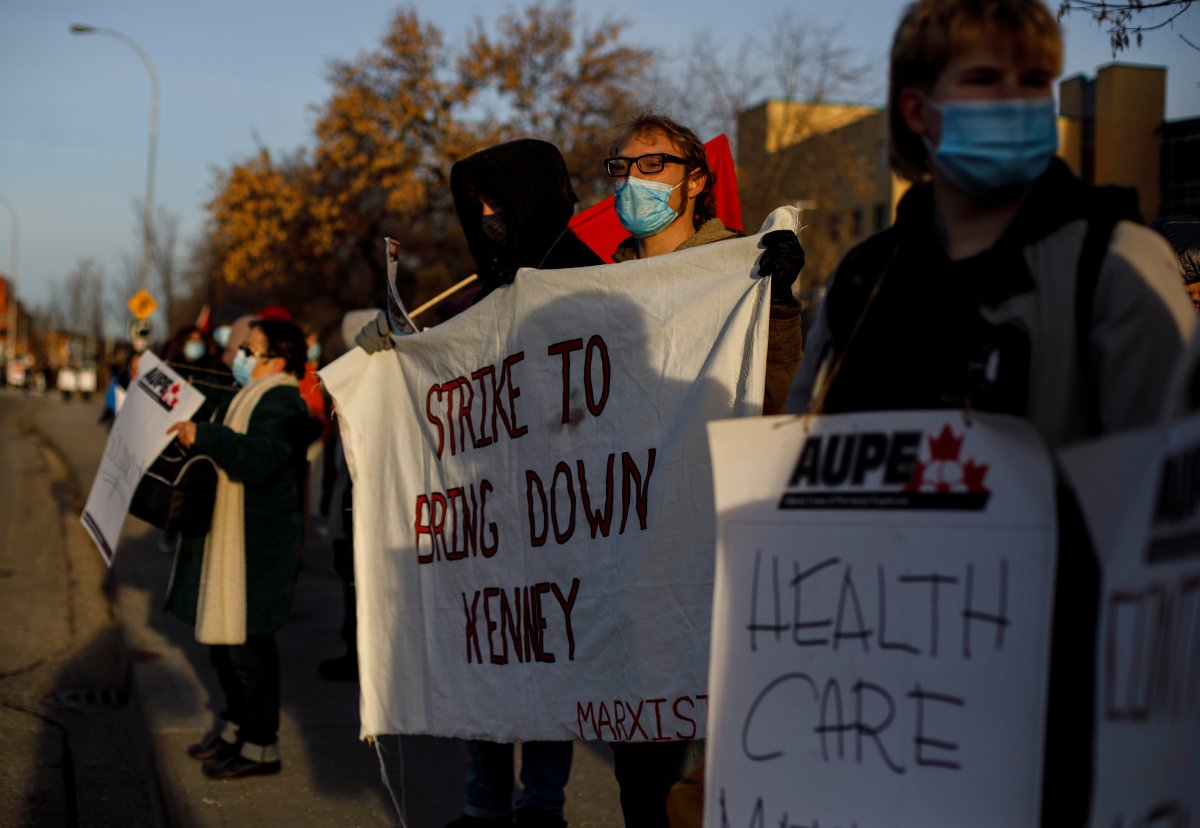
Everyone I talked to at the picket lines, every single one of us has seen preventable deaths. That’s not something I ever want to get used to.
This interview was conducted with an AUPE (Alberta Union of Provincial Employees) worker who participated in the Oct. 26 wildcat strikes in Alberta. We have concealed their identity since their employer, AHS (Alberta Health Services), has threatened punitive measures for those who took illegal job action.
Where do you work?
The University of Alberta Hospital.
What effects would the cuts and the privatizations have on the public health-care system in Alberta?
It would be absolutely devastating. Because it’s a real mess right now.
We’ve got underfunding, understaffing, there’s never enough people on the job. If there’s more than one emergency that happens at once, then one person dies. Even before COVID it was a catastrophe. Privatization is more expensive and it means worse care, because the profit has to come from somewhere, and the profit is siphoning off services that we can provide. If it means cutting corners, it means our benefits are gone. We would have to work at minimum wage. And it’s really a slap in the face for the work we do.
Housekeepers, environmental services, they’re incredibly frontline, despite what the government is saying. They are infection and biohazard experts, and their job isn’t just walking around with a mop. They put on hazmat suits and they deal with all these crazy chemicals and they’re really the front line for stopping infections and keeping patients safe. They save as many lives as the doctors do, honestly. And the UCP treat them as expendable. Because they don’t understand all labour is skilled labour, and this is something that cannot be contracted out. We absolutely can’t afford to do so.
Some details have emerged about single-source laundry and cleaning contracts being awarded to private companies who are donors to the UCP. Do you think these cuts and privatizations are ideological rather than financial or practical?
Yes, of course. That’s the whole purpose of all of this. There’s no good reason. The research doesn’t back up privatization. It shows in every case it’s more dangerous, that people die, that it’s actually more expensive.
K-Bro Linen, in my site, is already privatized and it’s bullshit. We’re always waiting on linen carts and they never have enough supply. We have to call down and harass them if there’s anybody on the phone to send up the linens. I feel sorry for the workers. It really holds up patient care. Nurses can’t do their jobs if they can’t get in the rooms and they can’t get in the rooms until they put on their isolation gowns.
So it really clogs up the system, and the fact that this is just to enrich a personal friend of Kenney’s, or whoever—it’s absolutely shocking and criminal, and I think they should be dressed down for this. Absolutely.
Do you have any examples in your hospital to contrast the difference between a publicly delivered service and a private one?
Only the stories of the nurses who’ve been there for 40 years and remember how it was before. And they complain about it all the time. On my site I think laundry’s been privatized since like ’95 or something. But yeah, the nurses who’ve been there forever, they often wishfully talk about how it all used to be in-house, and how much better it was.
What could you say has changed about your working environment since these cuts were announced?
Honestly at that point we were all just fucking exhausted. We were really, really struggling. Even before COVID we were working with skeleton crews and supply shortages, and understaffing like I said before, so it was really already a crisis. We were already getting harassed by the bed coordinators, telling us to push people out sooner, to discharge people earlier than they really should be. There was a crisis in health care before COVID. And so when we heard that there are cuts, people honestly didn’t really believe it. Because, well, how could they possibly cut further than this? We’re already struggling, and they were bleeding us out through attrition too before they even announced the cuts. We knew [the cuts] were happening but maybe not exactly the number. You hear every day this person retired, they’re not filling that position. There’s no overtime for when people do sick calls and stuff so one nurse might have to care for 20 patients.
And then with COVID, everybody’s exhausted and broken down from the first wave. So when people realized that it was real, it probably took actually a couple days before we realized it wasn’t just a rumor, or hearsay. They’d notified us they’re going through the legal process. That was a really bad couple of days, anger really boiled up, and anxiety was really really high. It was obvious something was going to snap. We just didn’t really know what. Everyone I talked to at the picket lines, every single one of us has seen preventable deaths. That’s not something I ever want to get used to

We just really couldn’t bear it any longer. When I heard news about the cuts, I didn’t even cry. I’d already gotten all my tears out the last few months. What changed is that at that point we knew for sure we would have nothing to lose.
Just to clarify, you said there are preventable deaths in Alberta hospitals because of a lack of funding, staff and resources?
Every health-care employee I know has seen preventable deaths.
How did you find out about the wildcat strikes on Oct. 26?
I heard that the housekeepers of the Royal Alex walked out, and my first thought was that we had to follow. People were confused at first, and thought it was just another info picket or something, but it took us by surprise the way that it happened. I guess that’s what happens in a wildcat. I think a lot of people were wishing they wore their winter boots once they realized what was going on.
Were you surprised that these wild cats exploded in the way they did?
I’m not surprised. No, I mean the day of, I was surprised, there was no notice. But like I said something was bound to happen and we all knew it. And it literally is a fight for our lives and our jobs and our patients so people were surprised to hear it. But it didn’t shock anyone, I don’t think.
And I think I realized we saw how ready people were even with so little notice, and in the future we will be organized. And now that we know our strength, hopefully we can build something even bigger.
What did you do, if anything, to encourage or organize the wildcat strikes?
I helped spread the news, as soon as I heard what happened at the Royal Alex and all across the province. For the corporate spies reading this, I was on my personal time, and I was just telling people the facts like they could have read on the news. As soon as people heard that their co-workers walked, they wanted to join.
How would you describe the energy on the picket lines?
I’ve never seen anything like it. It was the best day of my life. As soon as people realized that this was the real deal, and not just another info picket, the energy was just through the roof. Because this is cathartic, this is actually what we’ve been waiting for. It’s relieving the tension we’ve all been feeling and expressing it. There was chanting and singing, people passing around the megaphone to tell their stories about why they came out. It was awesome to see and it was also really cool just to meet all my co-workers who I work with every day and to hear what they actually do on the job and the troubles they’ve been having. It was really really fucking cool.
There was a bit of fear when that email came in about discipline from AHS. But at that point we all just sort of reminded each other that this is a bluff. We expected this. It’s completely predictable. But it did get people thinking though, because it was a really big break in tone. We get a lot of emails from the CEO, and from AHS and they’re all sort of warm and fuzzy feel-good emails. And this was a real break in character. That scared a lot of people but that also opened a lot of people’s eyes, and it proves that we made them scared.
What were the demands or phrases from your co-workers that stood out to you?
The primary one was no further layoffs, no further cuts. We want to protect what we have, and make sure that there is no privatization. And also an increase in health-care funding too. We kept saying this and everybody agreed that this is for our patients, and for our jobs, so we can deliver great care. We want an end to short-staffing, we want an end to these shitty working conditions, and we want extra funding to get us through the pandemic. Public health care is a right. And we need respect and the funding and resources to get our jobs done properly, not just words as we’ve had lots of. We’ve had lots of lip service. But we really need action and we need the things that make our jobs possible, and that includes the very basic notion of job security and a strong contract that protects us.
What would you say to the right-wing journalists or politicians who argued that health-care workers going out on wildcat strikes hurt patients?
I would say that AUPE was responsible and made sure we let certain people through the picket lines to preserve life and limb. We wanted to make sure nobody died because of the strike, and as far as I know no one did.
I also talked to a number of visitors who were visiting the hospital, and they were really upset they couldn’t visit their dying relatives. And I asked them: why is that the case? There’s no reason that you can’t visit. AHS absolutely has the capacity for you to see your dying relatives even though we’re out here, and you need to question AHS on why they’re doing that, because we’re here in support of your relatives. We want to be able to be able to deliver good care to them. The care they deserve. Because we can’t go on any longer, letting your relatives down. That would be my answer.
Would you say that the effects of this privatization would be worse than a prolonged labor unrest in health care?
Absolutely. Without a doubt. Even a prolonged labour unrest.
Even if a prolonged strike did lead to deaths, it would pale in comparison to the preventable deaths happening already, and that will continue happening, and that will get even worse if all these things are privatized. The system is already struggling, it’s in crisis. And it’s not keeping patients safe. We know better than the UCP what our patients need. And that’s a big part of what we were out there for on that day.
What kind of support from the public did you get on the picket lines?
There was absolutely incredible solidarity. Like I said about my coworkers, we definitely have a sense that we had each other’s backs. That solidarity was established really quickly. There was also lots of honking and cheering from people passing by, cars, buses, ambulances. One of the things that made me laugh was people on bikes ringing their bells. HSAA (Health Sciences Association of Alberta) and UNA (United Nurses of Alberta) were out there too. I know that they instructed their members to come join us on their breaks, which is a start towards getting the members to join us on work time.

We also had people bringing us coffee, people ordered pizza for the picket line. We don’t even know who these people are. A lot of people are getting calls from our conservative relatives telling us to keep it up. That shows that we had a really strong public support.
Do you think Albertans would be supportive of more wildcat strikes from health-care workers?
I think they absolutely would, and we see that with the evidence: how quickly it spread and the amount of support we had. So with regards to that decision [AUPE] made in response to the Labor Relations Board, I think our leadership underestimated us. They gave in on our behalf as soon as the government started posturing about it being illegal.
But that really wasn’t a problem for the people that I was picketing with—the fact that it was a wildcat. I don’t think it was a problem for the public either.
I think we should have called their bluff. And I think we could have done that successfully. Everybody there understood the risk when they walked off the job. And our leadership should have asked us, and taken into account the massive public support we have. I think in the face of fines for an illegal job action, we could have kept going and won, because we’re absolutely stronger than they are, especially with all the public support. If they came out to arrest us, I think the public would follow with pitchforks.
How likely is it that the employer, AHS, will fine or fire workers involved in the strike?
I would say slim but significant. Unfortunately, much higher now. We didn’t get to negotiations, which means there is no formal amnesty. But I don’t think that the government has the guts to do it, because it is the strength of the union that will prevent the layoffs or any disciplinary action. I know our union has told us to grieve any disciplinary action. I certainly hope that the response will be stronger than that to protect workers, and that the union will be proactive.
And if [AHS] tries to do anything, we’ve shown them we’re ready to defend ourselves. Eleven thousand of us, or 11,000 full-time equivalents which is almost 17,000 actual jobs, were going to be fired anyway, so we really have nothing to lose. But there is a risk, and we definitely need to call on the public to call on other unions to support the strikers proactively.
What should AUPE do now that the workers have gone back to work?
AUPE needs to continue to organize and mobilize. There’s a lot of strong momentum right now and we need to take advantage of that. This was a warning to the UCP to not pick a fight with us. We are in the public sector because we care. And we’re not going to accept austerity for our patients, ourselves, or any other workers they want to try to attack. When I went back to work, I had a lot of people asking me, “How long does the stop picketing order last?” and “When are we going to go back out?” And I think that really shows that we need to be preparing for next time.
And that means that the union has to step up and commit to the fight. Wildcats are all well and good, but we need the union to take control and lead all AUPE workers in the province at the same time. I know the essential services clauses mean that a legal strike is a whole drawn-out process, but this is a fight we can’t afford to lose, even if that means breaking the law. If AUPE doesnt want an illegal strike, then maybe they should lead a political protest that happens during work time, because the right to protest is in the Charter of Rights and Freedoms.

